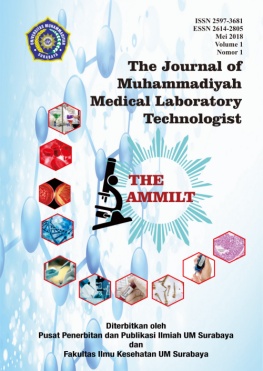Isi Artikel Utama
Abstrak
Â
abstract
Tofu is one of the healthy foods because of the relatively high protein content. In know that stored at room temperature will only last for 1-2 days. Therefore, many sellers know who gives the formalin to preserve know. Whereas the use of formaldehyde is very harmful for health. One of the efforts to secure the preservation know that the provision of 10% lemon juice and salt to 4% who will preserve up to 6 days at room temperature. Just know that the old storage can cause denaturation of proteins which can result in decreased levels of protein out. This study aims to investigate the influence of soaking in lemon juice and salt to the protein content out. The protein content was obtained through laboratory know the Micro-Kjeldahl method. The sample was 8 were divided into 4 groups: control, know by soaking for 1 day, 3 days and 6 days. To determine the effect of soaking the protein content out statistical analysis used ANOVA and continued to LSD.
The results of the data analysis ANOVA test showed that there was no effect of soaking time with the lemon juice and salt to the protein content of tofu (p values> 0.05). Average protein content know that soaked for 1 day 13.24%, 12.78% and 3 days 6 days 12.34%. So it can be concluded that aging out with lemon juice and salt has no effect on protein levels out. Therefore preservation know this way is relatively safe and does not reduce the levels of proteins out.
Rincian Artikel
Referensi
- Deiana M., A. Rosa., V. Casu., F. Cotiglia., L. Bonsing More and M.A. Dessi. 2003. Chemical Composition and Antioxidant Activity of Extract from Dephegnidium L. JAOCS. 80 1 65-70
- Naharsari, N,D. 2007. Bercocok Tanam Jeruk. Azka Mulia Media : Jakarta
- Shahidi, F, Desilva, C and Amarowiz, R. 2003. Antioxidant Activity of Extract of Defatted Seeds of Niger (Goizotia Abyssinica). JOACS. 80. 5. 443-450
- Handoko, Haryo Bagus, SP. 2011. Makanan Awet Muda dan Panjang Umur. PT Elex Media Komputindo : Jakarta
- Harmoni, D. 2006. Seluk Beluk Formalin. www.hd.co.id
- Herawati, Dian dkk. 2011. Analisis Pangan. Dian Rakyat : Jakarta
- Hernani dan Mono Raharjo., 2005, “Tanaman Berkhasiat Antioksidan†Penerbit Swadaya, Jakarta.
- Kompas. 2005. Keamanan Pangan. www.kompas.com
- Kompas. 2005. Waspadai Adanya Makanan Berformalin. www.kompas.com
- Koswara, S. Mengawetkan Tahu Tanpa Formalin. Institut Pertanian Bogor
- Mustafa, R.M. 2006. Studi Efektivitas Bahan Pengawet Alami Dalam Pengawetan Tahu. Institut Pertanian Bogor (IPB)
- Mudjajanto. 2005. Tahu, Makanan Favorit Yang Perlu Diwaspadai. www.kompas.com
- ________. 2000. Peningkatan Proses dan Kemasan Tahu. Departemen Perindustrian dan Perdagangan
- Redaksi AgroMedia. 2010. Membuat Tahu dan Tempe. PT AgroMedia Pustaka : Jakarta
- Republika. 2005. Hindarkan Pemakaian Legal Formalin untuk Pangan. http://www.republika.co.id
- Republika. 2005. Perusahaan Tahu Takwa Poo di Kediri Berencana Gugat Balai POM. http://www.republika.co.id
- Sarwono, B dan Yan Pieter. 2005. Membuat Aneka Tahu. Penebar Swadaya : Jakarta
- SNI 01- 3142-1992
- Suprapti, Lies. 1997. Dasar-dasar Teknologi Pangan. Vidi Ariesta : Surabaya
- Winarno, F.G. 2004. Kimia Pangan Dan Gizi. PT Gramedia Pustaka Utama : Jakarta
Referensi
Deiana M., A. Rosa., V. Casu., F. Cotiglia., L. Bonsing More and M.A. Dessi. 2003. Chemical Composition and Antioxidant Activity of Extract from Dephegnidium L. JAOCS. 80 1 65-70
Naharsari, N,D. 2007. Bercocok Tanam Jeruk. Azka Mulia Media : Jakarta
Shahidi, F, Desilva, C and Amarowiz, R. 2003. Antioxidant Activity of Extract of Defatted Seeds of Niger (Goizotia Abyssinica). JOACS. 80. 5. 443-450
Handoko, Haryo Bagus, SP. 2011. Makanan Awet Muda dan Panjang Umur. PT Elex Media Komputindo : Jakarta
Harmoni, D. 2006. Seluk Beluk Formalin. www.hd.co.id
Herawati, Dian dkk. 2011. Analisis Pangan. Dian Rakyat : Jakarta
Hernani dan Mono Raharjo., 2005, “Tanaman Berkhasiat Antioksidan†Penerbit Swadaya, Jakarta.
Kompas. 2005. Keamanan Pangan. www.kompas.com
Kompas. 2005. Waspadai Adanya Makanan Berformalin. www.kompas.com
Koswara, S. Mengawetkan Tahu Tanpa Formalin. Institut Pertanian Bogor
Mustafa, R.M. 2006. Studi Efektivitas Bahan Pengawet Alami Dalam Pengawetan Tahu. Institut Pertanian Bogor (IPB)
Mudjajanto. 2005. Tahu, Makanan Favorit Yang Perlu Diwaspadai. www.kompas.com
________. 2000. Peningkatan Proses dan Kemasan Tahu. Departemen Perindustrian dan Perdagangan
Redaksi AgroMedia. 2010. Membuat Tahu dan Tempe. PT AgroMedia Pustaka : Jakarta
Republika. 2005. Hindarkan Pemakaian Legal Formalin untuk Pangan. http://www.republika.co.id
Republika. 2005. Perusahaan Tahu Takwa Poo di Kediri Berencana Gugat Balai POM. http://www.republika.co.id
Sarwono, B dan Yan Pieter. 2005. Membuat Aneka Tahu. Penebar Swadaya : Jakarta
SNI 01- 3142-1992
Suprapti, Lies. 1997. Dasar-dasar Teknologi Pangan. Vidi Ariesta : Surabaya
Winarno, F.G. 2004. Kimia Pangan Dan Gizi. PT Gramedia Pustaka Utama : Jakarta

